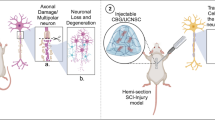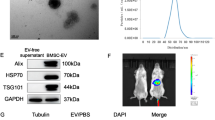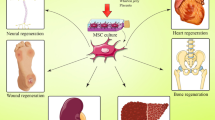Abstract
Stem cell transplantation is a promising method in the treatment of spinal cord injury (SCI). Researches have shown that stem cell-derived exosomes as well as its contents such as microRNAs contribute to the protective effects of stem cell against SCI. However, the effects of exosomes derived from bone marrow stem cells on SCI and the underlying mechanisms remain unknown. In this study, we collected bone marrow stem cells derived exosomes (BMSCs-exo) to deal with SCI rats and LPS induced microglia to explore the possible mechanisms. We found that BMSCs-exo showed significant effects on decreasing pro-inflammatory cytokines as well as increasing Basso–Beattie–Bresnahan score after acute SCI. MicroRNA-181c levels in tissue were elevated with the use of BMSCs-exo. Then we verified the effect in vitro and found that in LPS induced microglia, the administration of BMSCs-exo could inhibit the expression of pro-inflammatory cytokines, and the phosphorylation of NF-κB signal was also suppressed. During which, the expression of microRNA-181c in microglia was elevated. When LPS induced microglia were treated with BMSCs-exo over-expressing microRNA-181c, the levels of pro-inflammatory cytokines decreased. Then bioinformatics techniques were used to detect the possible target gene of microRNA-181c and then PTEN was found as a candidate. Further experiments showed that the protection effects of BMSCs-exo over-expressing microRNA-181c could be antagonized by the elevation of PTEN expression both in vitro and in vivo. In conclusion, we verified that BMSCs-exo could protect against SCI through its content microRNA-181c which suppressed the inflammation in microglia and spinal cord. It was related to the inhibition of PTEN and the suppression of NF-κB signal, and finally decreasing inflammation and apoptosis in spinal cord and improved SCI.








Similar content being viewed by others
References
Chen Z, Trapp BD (2016) Microglia and neuroprotection. J Neurochem 136(Suppl 1):10–17. https://doi.org/10.1111/jnc.13062
Chen CC et al (2016) Elucidation of exosome migration across the blood–brain barrier model in vitro. Cell Mol Bioeng 9:509–529. https://doi.org/10.1007/s12195-016-0458-3
Chen HL et al (2019a) Scutellarin exerts anti-inflammatory effects in activated microglia/brain macrophage in cerebral ischemia and in activated BV-2 microglia through regulation of MAPKs signaling pathway. Neuromol Med. https://doi.org/10.1007/s12017-019-08582-2
Chen Z, Dong WH, Chen Q, Li QG, Qiu ZM (2019b) Downregulation of miR-199a-3p mediated by the CtBP2-HDAC1-FOXP3 transcriptional complex contributes to acute lung injury by targeting NLRP1. Int J Biol Sci 15:2627–2640. https://doi.org/10.7150/ijbs.37133
David S, Kroner A (2011) Repertoire of microglial and macrophage responses after spinal cord injury. Nat Rev Neurosci 12:388–399. https://doi.org/10.1038/nrn3053
DiSabato DJ, Quan N, Godbout JP (2016) Neuroinflammation: the devil is in the details. J Neurochem 139(Suppl 2):136–153. https://doi.org/10.1111/jnc.13607
Fan B et al (2018) Microenvironment imbalance of spinal cord injury. Cell Transplant 27:853–866. https://doi.org/10.1177/0963689718755778
Fan XL, Zhang Y, Li X, Fu QL (2020) Mechanisms underlying the protective effects of mesenchymal stem cell-based therapy. Cell Mol Life Sci. https://doi.org/10.1007/s00018-020-03454-6
Gong J, Meng HB, Hua J, Song ZS, He ZG, Zhou B, Qian MP (2014) The SDF-1/CXCR4 axis regulates migration of transplanted bone marrow mesenchymal stem cells towards the pancreas in rats with acute pancreatitis. Mol Med Rep 9:1575–1582. https://doi.org/10.3892/mmr.2014.2053
Guzman-Martinez L, Maccioni RB, Andrade V, Navarrete LP, Pastor MG, Ramos-Escobar N (2019) Neuroinflammation as a common feature of neurodegenerative disorders. Front Pharmacol 10:1008. https://doi.org/10.3389/fphar.2019.01008
Huang JH et al (2017) Systemic administration of exosomes released from mesenchymal stromal cells attenuates apoptosis, inflammation, and promotes angiogenesis after spinal cord injury in rats. J Neurotrauma 34:3388–3396. https://doi.org/10.1089/neu.2017.5063
Huang JH, Xu Y, Yin XM, Lin FY (2020) Exosomes derived from miR-126-modified MSCs promote angiogenesis and neurogenesis and attenuate apoptosis after spinal cord injury in rats. Neuroscience 424:133–145. https://doi.org/10.1016/j.neuroscience.2019.10.043
Hyun JK, Lee YI, Son YJ, Park JS (2009) Serial changes in bladder, locomotion, and levels of neurotrophic factors in rats with spinal cord contusion. J Neurotrauma 26:1773–1782. https://doi.org/10.1089/neu.2007.0485
Ji C, Guo X (2019) The clinical potential of circulating microRNAs in obesity. Nat Rev Endocrinol 15:731–743. https://doi.org/10.1038/s41574-019-0260-0
Ji LJ, Li F, Zhao P, Weng LP, Wei J, Yan J, Liu LN (2019) Silencing interleukin 1alpha underlies a novel inhibitory role of miR-181c-5p in alleviating low-grade inflammation of rats with irritable bowel syndrome. J Cell Biochem 120:15268–15279. https://doi.org/10.1002/jcb.28794
Kanazawa M, Ninomiya I, Hatakeyama M, Takahashi T, Shimohata T (2017) Microglia and monocytes/macrophages polarization reveal novel therapeutic mechanism against stroke. Int J Mol Sci. https://doi.org/10.3390/ijms18102135
Lee C et al (2012) Exosomes mediate the cytoprotective action of mesenchymal stromal cells on hypoxia-induced pulmonary hypertension. Circulation 126:2601–2611. https://doi.org/10.1161/CIRCULATIONAHA.112.114173
Li Z, Rana TM (2014) Therapeutic targeting of microRNAs: current status and future challenges. Nat Rev Drug Discov 13:622–638. https://doi.org/10.1038/nrd4359
Li X et al (2016) Exosome derived from human umbilical cord mesenchymal stem cell mediates MiR-181c attenuating burn-induced excessive inflammation. EBioMedicine 8:72–82. https://doi.org/10.1016/j.ebiom.2016.04.030
Li D et al (2018a) Exosomes derived from miR-133b-modified mesenchymal stem cells promote recovery after spinal cord injury. Front Neurosci 12:845. https://doi.org/10.3389/fnins.2018.00845
Li Y, Cheng Q, Hu G, Deng T, Wang Q, Zhou J, Su X (2018b) Extracellular vesicles in mesenchymal stromal cells: a novel therapeutic strategy for stroke. Exp Ther Med 15:4067–4079. https://doi.org/10.3892/etm.2018.5993
Li Q et al (2020a) Inhibition of miR-21 alleviated cardiac perivascular fibrosis via repressing EndMT in T1DM. J Cell Mol Med 24:910–920. https://doi.org/10.1111/jcmm.14800
Li X et al (2020b) Microglial Hv1 exacerbates secondary damage after spinal cord injury in mice. Biochem Biophys Res Commun. https://doi.org/10.1016/j.bbrc.2020.02.012
Liu NK, Wang XF, Lu QB, Xu XM (2009) Altered microRNA expression following traumatic spinal cord injury. Exp Neurol 219:424–429. https://doi.org/10.1016/j.expneurol.2009.06.015
Liu H, Li D, Zhang Y, Li M (2018) Inflammation, mesenchymal stem cells and bone regeneration. Histochem Cell Biol 149:393–404. https://doi.org/10.1007/s00418-018-1643-3
Lou G, Chen Z, Zheng M, Liu Y (2017) Mesenchymal stem cell-derived exosomes as a new therapeutic strategy for liver diseases. Exp Mol Med 49:e346. https://doi.org/10.1038/emm.2017.63
Martirosyan NL et al (2016) The role of microRNA markers in the diagnosis, treatment, and outcome prediction of spinal cord injury. Front Surg 3:56. https://doi.org/10.3389/fsurg.2016.00056
Maugeri M et al (2016) Altered expression of miRNAs and methylation of their promoters are correlated in neuroblastoma. Oncotarget 7:83330–83341. https://doi.org/10.18632/oncotarget.13090
Phinney DG, Pittenger MF (2017) Concise review: MSC-derived exosomes for cell-free therapy. Stem Cells 35:851–858. https://doi.org/10.1002/stem.2575
Qi K, Li N, Zhang Z, Melino G (2018) Tissue regeneration: the crosstalk between mesenchymal stem cells and immune response. Cell Immunol 326:86–93. https://doi.org/10.1016/j.cellimm.2017.11.010
Qing L, Chen H, Tang J, Jia X (2018) Exosomes and their MicroRNA Cargo: new players in peripheral nerve regeneration. Neurorehabil Neural Repair 32:765–776. https://doi.org/10.1177/1545968318798955
Regulski MJ (2017) Mesenchymal stem cells: “Guardians of Inflammation.” Wounds 29:20–27
Rodrigues LF, Moura-Neto V, TCLS ES (2018) Biomarkers in spinal cord injury: from prognosis to treatment. Mol Neurobiol 55:6436–6448. https://doi.org/10.1007/s12035-017-0858-y
Shi X, Liu Y, Zhang D, Xiao D (2019) Valproic acid attenuates sepsis-induced myocardial dysfunction in rats by accelerating autophagy through the PTEN/AKT/mTOR pathway. Life Sci 232:116613. https://doi.org/10.1016/j.lfs.2019.116613
Song H et al (2019) Cortical neuron-derived exosomal MicroRNA-181c-3p inhibits neuroinflammation by downregulating CXCL1 in astrocytes of a rat model with ischemic brain injury. NeuroImmunoModulation 26:217–233. https://doi.org/10.1159/000502694
Sugaya K, Vaidya M (2018) Stem cell therapies for neurodegenerative diseases. Adv Exp Med Biol 1056:61–84. https://doi.org/10.1007/978-3-319-74470-4_5
Tang Y, Le W (2016) Differential roles of M1 and M2 microglia in neurodegenerative diseases. Mol Neurobiol 53:1181–1194. https://doi.org/10.1007/s12035-014-9070-5
Thery C, Zitvogel L, Amigorena S (2002) Exosomes: composition, biogenesis and function. Nat Rev Immunol 2:569–579. https://doi.org/10.1038/nri855
Vizoso FJ, Eiro N, Cid S, Schneider J, Perez-Fernandez R (2017) Mesenchymal stem cell secretome: toward cell-free therapeutic strategies in regenerative medicine. Int J Mol Sci. https://doi.org/10.3390/ijms18091852
Wang Y, Chen X, Cao W, Shi Y (2014) Plasticity of mesenchymal stem cells in immunomodulation: pathological and therapeutic implications. Nat Immunol 15:1009–1016. https://doi.org/10.1038/ni.3002
Wang L et al (2018) Mesenchymal stem cell-derived exosomes reduce A1 astrocytes via downregulation of phosphorylated NFkappaB P65 subunit in spinal cord injury. Cell Physiol Biochem 50:1535–1559. https://doi.org/10.1159/000494652
Weiss ARR, Dahlke MH (2019) Immunomodulation by mesenchymal stem cells (MSCs): mechanisms of action of living, apoptotic, and dead MSCs. Front Immunol 10:1191. https://doi.org/10.3389/fimmu.2019.01191
Wu P, Zhang B, Shi H, Qian H, Xu W (2018) MSC-exosome: a novel cell-free therapy for cutaneous regeneration. Cytotherapy 20:291–301. https://doi.org/10.1016/j.jcyt.2017.11.002
Zhang B, Yin Y, Lai RC, Tan SS, Choo AB, Lim SK (2014) Mesenchymal stem cells secrete immunologically active exosomes. Stem Cells Dev 23:1233–1244. https://doi.org/10.1089/scd.2013.0479
Zhang J, Li S, Li L, Li M, Guo C, Yao J, Mi S (2015) Exosome and exosomal microRNA: trafficking, sorting, and function. Genomics Proteomics Bioinform 13:17–24. https://doi.org/10.1016/j.gpb.2015.02.001
Zhou X, He X, Ren Y (2014) Function of microglia and macrophages in secondary damage after spinal cord injury. Neural Regen Res 9:1787–1795. https://doi.org/10.4103/1673-5374.143423
Zhou M et al (2019) The modulation of regulatory T cells via HMGB1/PTEN/beta-catenin axis in LPS induced acute lung injury. Front Immunol 10:1612. https://doi.org/10.3389/fimmu.2019.01612
Funding
This research did not receive any specific grant from funding agencies in the public, commercial, or not-for-profit sectors.
Author information
Authors and Affiliations
Corresponding author
Ethics declarations
Conflict of interest
The authors declare that they have no competing interests.
Additional information
Publisher’s note
Springer Nature remains neutral with regard to jurisdictional claims in published maps and institutional affiliations.
Supplementary information
Below is the link to the electronic supplementary material.
Rights and permissions
About this article
Cite this article
Zhang, M., Wang, L., Huang, S. et al. Exosomes with high level of miR-181c from bone marrow-derived mesenchymal stem cells inhibit inflammation and apoptosis to alleviate spinal cord injury. J Mol Histol 52, 301–311 (2021). https://doi.org/10.1007/s10735-020-09950-0
Received:
Accepted:
Published:
Issue Date:
DOI: https://doi.org/10.1007/s10735-020-09950-0




